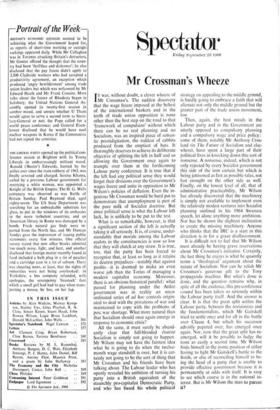Mr Crossman's Wheeze
IT was, without doubt, a clever wheeze of Mr Crossman's. The sudden discovery that the wage freeze imposed at the behest of the international bankers and in the teeth of trade union opposition is none other than the first step on the road to that `framework of compulsion' without which there can be no real planning and no Socialism, was an inspired piece of seman- tic prestidigitation, the reddest of rabbits produced from the emptiest of hats. It thoroughly deserves to achieve its deliberate objective of splitting the left in half and so allowing the Government once again to trample over them at the forthcoming Labour party conference. It is true that if the left had any political sense they would forget their divisions over the Government's wages freeze and unite in opposition to Mr Wilson's policies of deflation. Even the in- genious Mr Crossman would be hard put to demonstrate that unemployment is part of the pure milk of Socialist doctrine. But since political sense is what the Labour left lack, he is unlikely to be put to the test.
What is so remarkable, however, is that a significant section of the left is actually taking it all seriously. It is, of course, under- standable that morale among the Labour zealots in the constituencies is now so low that they will clutch at any straw. It is true, too, that the party has been forced to recognise that, at least so long as it retains its dearest prejudices—notably that against profits—it is doomed to make an even worse job than the Tories of managing a modern capitalist economy. Moreover, there is an obvious historical parallel : what passed for planning under the Attlee government was in reality an unco- ordinated series of ad hoc controls origin- ated to deal with the privations of war and maintained to cope with the problems of posi. war shortage. What more natural than that Socialism should once again emerge in response to economic crisis?
All the same, it must surely be abund- antly clear that full-blooded etatiste Socialism is simply not going to happen. Mr Wilson may not have the faintest idea what he is going to do when the twelve- month wage standstill is over, but it is cer- tainly not going to be the sort of thing that Mr Crossman and his friends have been talking about. The Labour leader who has openly revealed his ambition of turning his party into a British equivalent of the staunchly pro-capitalist Democratic. Party, and who has based his whole political strategy on appealing to the middle ground, is hardly going to embrace a faith that will alienate not only the middle ground but the greater part of the trade union movement, too.
Then, again, the best minds in the Labour party and in the Government are utterly opposed to compulsory planning and a compulsory wage and price policy : some of them, notably Mr Anthony Cros- land (in The Future of Socialism and else- where), have spent a large part of their political lives in knocking down this sort of nonsense. A nonsense, indeed, which is not only rejected by every Socialist government this side of the iron curtain but which is being jettisoned as fast as possible (alas, not fast enough) on the other side as well. Finally, on the lowest level of all, that of administrative practicability, Mr Wilson has already discovered that the machinery, is simply not available to implement even the relatively modest ventures into Socialist planning outlined in his 1964 Swansea speech, let alone anything more ambitious. Nor has he shown the slightest inclination to create the missing machinery. Anyone who thinks that the IRC is a start in this direction is in for a grave disillusionment.
It is difficult not to feel that Mr Wilson must already be having grave reservations about Mr Crossman's initiative. Certainly, the last thing he enjoys is what he quaintly terms a 'theological' argument about the nature of Socialism. Nor can he relish Mr Crossman's generous gift to the Tory propaganda machine. But what's done is done, and the question remains why, in spite of all the evidence, this pre-conference canard has been taken so seriously within the Labour party itself. And the answer is clear. It is that the great split within the Labour party, between the revisionists and the fundamentalists, which Mr Gaitskell tried to settle once and for all in the battle over Clause 4, but which his successor adroitly papered over, has emerged once again. Nor, now that the great split has re- emerged, will it be possible to fudge the issue as easily a second time. Mr Wilson finds himself in the ironic position of either having to fight Mr Gaitskell's battle to the finish, or else of reconciling himself to be- ing the head of a party that is unable to provide effective government because it is permanently at odds with itself. It is easy to see which course is in the national in- terest. But is Mr Wilson the man to pursue it?


































 Previous page
Previous page